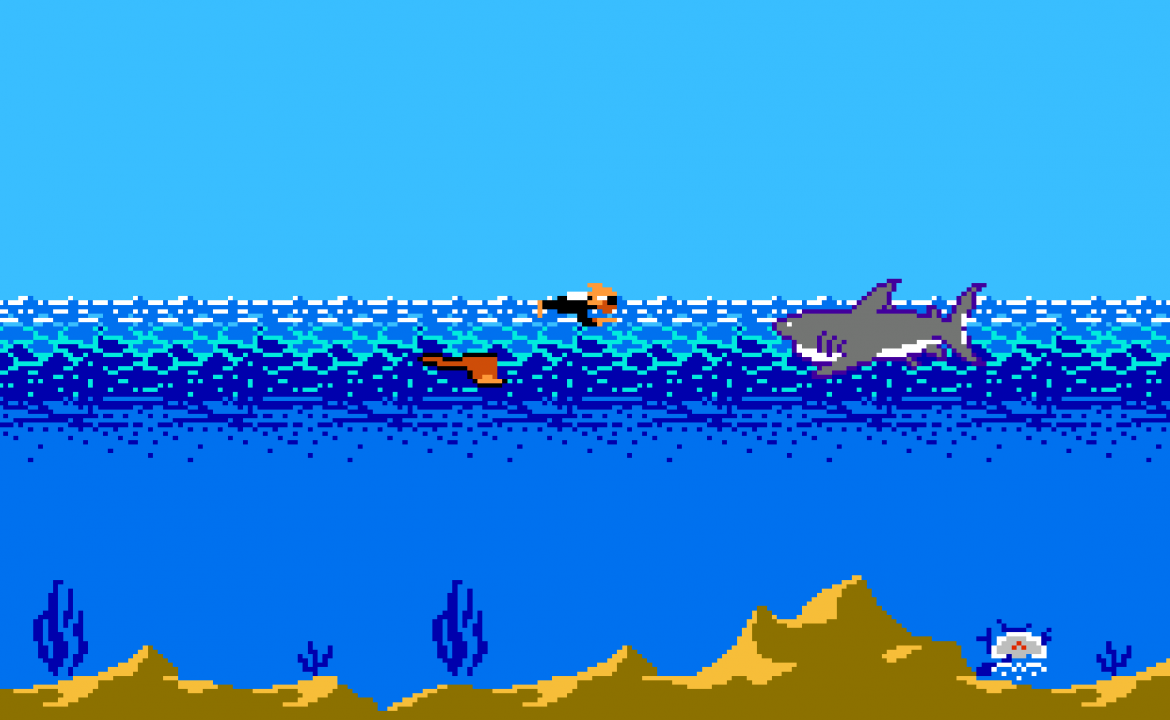Welcome back, readers.
Videogames? Videogames. I’ve looked up from a packed-but-gratifying semester of teaching queer Twine games just long enough to put together this week’s latest issue, which features nihilism, Deltarune, story ideologies, and another out-of-context fish picture. Enjoy!
This Week in Videogame Blogging is a roundup highlighting the most important critical writing on games from the past seven days.
Unpacking Ideologies
Nihilism, war crimes, and death distraction are the themes that open our issue this week as three writers explore the ways in which games reflect our existential anxieties.
- Twilight Grotesques, Aftermath Innocents | Wars Of Future Past
Kelsey D. Atherton unpacks ‘fog of war’ as a gameplay mechanic, ideological container, and reductive obfuscation of real-world civilian casualties (content notifaction: the article gets into the recent US drone-facilitated murder of 10 Afghan civilians, including 7 children). - [Opinión] La filosofía nihilista de la saga Far Cry | GamerFocus
Julián Ramírez breaks down why choices mean so little in Far Cry‘s pessimistic sandboxes (Spanish-language article). - Destiny Anxiety | Bullet Points Monthly
Yussef Cole muses on how Destiny 2 and other live-service ‘forever’ games mirror our own perpetual distraction-seeking in the face of endings and death.
“So you play in the graveyard, in the twilight of a once vibrant civilization, one that once lived and died. And you struggle vainly against the natural decomposition of the Final End. “The light and darkness saga will end … Destiny 2 will not,” remember. Your unnatural, inhuman bodies will continue to twirl and frolic through the dark, cycling through nonsensical emotes, casting yourselves off ledges and into canyons while your anxious ghosts hurriedly suck you back into corporeal existence.”
Deltarune
Deltarune‘s latest chapter dropped a short while ago, and the critical discourse is starting to unpack the ideas it brings to the table. Here are two of my favourite recent selections.
- Deltarune Chapter 2 offers a brief reprieve in a world that’s still healing | Polygon
Ana Diaz spends some time with the second part of Toby Fox’s more ambiguous sophmore effort. - Deltarune and the formulaic fallacy | The Indie Game Website
Jeremy Signor contemplates how Deltarune makes use of the familiar to pique the player for the new.
“When we refer to something as “formulaic”, we often mean it as a bad thing, a criticism or insult. After all, once you recognise the formula of something, it ceases to be distinct or even surprising, or at least in the eyes of many. But what this notion misses about formulas, is that a game can surprise you because it adheres to one.”
Fresh Impressions
There’s lots of other cool and interesting stuff out recently besides Deltarune. Here’s a couple of critical pieces on this week’s pieces on new and re-newed games.
- Death Stranding Is The Strangest Game In The World To Replay | TheGamer
Jade King breaks down why extrme package delivery with ghosts may not necessarily reward repeat playthroughs. - Sable review | PC Gamer
Natalie Clayton makes her way through a game about making your way through the world.
“Sable is, ultimately, a game about needing space to figure yourself out. Sable is still a child, and the story sets no stakes above her figuring out who she wants to be.”
Dev Talk
We’ve also got two interview highlights this week, touching upon Boyfriend Dungeon and a forgotten Half-Life expansion.
- These modders are on a mission to remake Half-Life’s most obscure spin-off | PC Gamer
Amelia Hansford chronicles a four-person team’s efforts to resurrect an ecclectic console-exclusive Half-Life expansion. - The aftermath and future of Boyfriend Dungeon with Tanya X Short | Gayming Magazine
Aimee Hart chats with Tanya X Short about double-standards, the imperfections of art, and breaking out of cyclical discourse.
“With that background in mind, it was always going to be impossible for Boyfriend Dungeon to please everyone. It’s a statement that Short agrees with when I ask her about the reception to the game, and whether she feels that queer creators in particular are being held to an impossible standard. “I do feel that we’re held to a higher standard, and I do wish that standard was more evenly applied.” She tells me.”
Rising Action, Falling Action
Our next selection of three pieces highlights narrative ideologies, authorship, and the fluctuating limits of storytelling in mass media.
- “Mercurial drama queen hack” – Kimimi The Game-Eating She-Monster
Kimimi unpacks how, despite unlikely appearances, MadWorld is every inch a Yasumi Matsuno game. - D&D 5e Is Deeply Flawed, So Why Not Play Something Better? | Kotaku
Renata Price contemplates the mechanical and storytelling limitations of a TTRPG system trying to be everything for everyone, and posits some more focused alternatives. - Diary of a Hardline Shep, Part 2: Space Colonialism Is Still Colonialism | Sidequest
Kael Langdon wonders about the kind of ideological worldbuilding that necessitates ‘evil’ races and unambiguous enemies for your Shepard to shoot.
“The only Batarians I interacted with in Mass Effect 1 were heartless criminals. They were slavers, they were raiders, they were drug smugglers. They existed in my bloody backstory and in combat encounters. As far as I know, the only Batarian with a speaking role did so by holding a room full of people hostage.”
Critical Chaser
A little Spine to close out the week.
- 56: The Last of Us Part II | Into The Spine
Diego Nicolás Argüello’s latest photo-narrative.
Subscribe
Critical Distance is community-supported. Our readers support us from as little as one dollar a month. Would you consider joining them?
Contribute
Have you read, seen, heard or otherwise experienced something new that made you think about games differently? Send it in!


